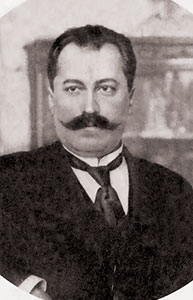(1902, from the memoirs of Dmitry Doroshenko)
In the spring of 1902, somewhere around March or early April, the Ukrainian community in St. Petersburg celebrated the anniversary of Shevchenko's death. Of course, on the poet's death day, a solemn memorial service was held at the Kazan Cathedral, which stands on the main street, Nevsky Prospect, and is one of the main churches in the capital. Many people gathered for this service, and it was possible to see prominent figures, writers, scholars, and artists who came to honor the memory of the great Ukrainian poet. In the evening (not always on the same day, sometimes much later), a concert took place, or as it was called in Galicia, an "academy." Comparing to not long before my arrival, the government had begun allowing the Shevchenko concert; prior to that, Shevchenko’s memory was honored with a semi-private banquet in a restaurant. For the concert, one of the largest and best halls in the capital was rented. The concert I attended took place at the Noble Assembly Hall (that is, the noble club) under the auspices of the Shevchenko Society and for its benefit. It was the first time in my life that I attended a Shevchenko concert, and one can imagine how eagerly I observed and listened to everything that happened before me!Upon entering the hall, I saw that many students – both male and female – were dressed in national attire, which gave the audience a picturesque appearance. There were probably no fewer than two thousand people, and maybe even more, because by the beginning of the concert, the hall was filled to the brim. On stage stood a beautifully decorated large bust of Shevchenko. The concert program was carefully selected. Its highlight was the recitation by the father of Ukrainian theater, Marko Kropyvnytsky, who at that time was performing with O. Suslov’s troupe in St. Petersburg. He recited Shevchenko’s "The Monk," which was considered his "signature" piece. A whole series of artists from the Imperial Opera performed, where Ukrainians had always worked as singers and were known for their remarkable voices. Not long before that, members of the Imperial theaters had been prohibited from performing at public events under their real names. They circumvented this ban by using three stars in place of their names, but the audience knew who was behind the stars and would give a standing ovation to the famous singers when they appeared on stage. During my time, the tenor Grigory Morsky often performed. The wonderful student choir also sang, rehearsing their numbers at the Andriyivska School. The repertoire of solo and choral pieces consisted of the immortal compositions of Lysenko, the best musical interpretation of the "Kobzar."
For me, however, the greatest attraction of the concert was the introductory speech that was to be delivered by the president of the Shevchenko Society, the famous Ukrainian writer Danilo Mordovets, a senior member of the Ukrainian writers in St. Petersburg. This was the first time in my life that I was going to hear a public speech in the Ukrainian language. Mordovets, a friend and almost a contemporary of Kostomarov, was well known among the wider public in Russia as the author of a series of historical novellas in Russian on Ukrainian subjects. His novellas "Sahaydachny," "The Tsar and the Hetman," "Archimandrite-Hetman," "Tymish," and others were especially popular. Even in his novellas about Moscow life, he included Ukrainian elements, emphasizing the superiority of Ukrainian customs and folk culture compared to those of Moscow. Mordovets also wrote small stories in Ukrainian about folk life, and towards the end of his life, he wrote historical novellas in Ukrainian as well, such as "Paliy, the Reviver of Right-Bank Ukraine," "Two Fates," "The Cup of Charles XII," and others. In the pages of St. Petersburg's liberal newspapers, mainly in *Novosti*, Mordovets wrote articles defending the Ukrainian cause against the attacks and mockery of Russian nationalist writers. Among Ukrainian circles, he was greatly loved for his gentle, kind nature and his readiness to help his fellow countrymen in any matter. "Grandfather Mordovets" was also popular among the youth, serving as their friend and guardian.
With his long white beard, like a patriarch, he stepped onto the stage—he was supported under his arms as he was quite frail. He bowed low in front of the Shevchenko bust and took out a newspaper from his pocket. It was an issue of the American *Svoboda* newspaper. At that time, few people knew of the existence of Ukrainian press across the ocean, and there was still no Ukrainian press in Russia. This became the basis of Mordovets' speech. "Look," he said, "see how far the words of Shevchenko have reached—they've crossed the ocean. And there they know and honor our Kobzar..." Clearly, the old man could not add: *"Across the ocean, our word is free, but here it has no freedom!"* The old man was greeted with enthusiastic applause for a long time.The concert program and the entire performance were flawless and could satisfy even the most demanding listener, but it ended in a way that saddened and disappointed not only me, but many of the attendees: after the concert, the dancing began! This was a characteristic feature of Ukrainian concerts in St. Petersburg (this never happened in Kyiv or other cities in Ukraine during Shevchenko's anniversary), and members of the Ukrainian community tried to fight it, though they didn't manage to completely eliminate it until later; it seems that by 1903, the Shevchenko anniversary celebrations no longer included dances, which, in essence, showed a lack of respect for the poet's memory. When I expressed my indignation about the dancing to the organizers of the concert, they explained that for the broad public of "Little Russians," those dances were one of the attractions of Ukrainian evenings. Since the goal of the concert was also to make as much profit as possible, they claimed, they had to tolerate the dancing at Shevchenko's anniversary.
By the way, I only found out later, after I became a member of the Ukrainian Student Society, that the larger part of the income, according to the agreement between the administration of the Shevchenko Society and the Ukrainian Student Society, went to the Society’s fund for political purposes. This was done in such a way that certain members of the Society would submit requests to the administration of the Shevchenko Society for financial assistance. After receiving this assistance, they would then deposit the money into the Society's fund, and the authorities had no way of controlling this. Not all members of the Shevchenko Society’s administration were aware of this patriotic maneuver, as not all, for example, shared the political goals pursued by the youth. The profits from the Shevchenko evenings were significant, and sometimes several thousand rubles would end up in the Society’s fund. No one suspected that the publication of the Ukrainian Revolutionary Party in Chernivtsi or Lviv was funded with the money from the Shevchenko evening profits in St. Petersburg.
I remembered Kropivnitsky's participation in the Shevchenko concert. St. Petersburg was connected with the beginnings of his stage career, when he was at the head of his famous troupe and reaped the laurels among the capital's public. He even performed before Tsar Alexander III, and the St. Petersburg press sang his praises. At that time, his troupe included talents like Maria Zankovetska, Mykola Sadovsky, Opanas Saksahansky, and Hanna Zatyrkievich-Karpinska, the pioneers of Ukrainian theater who elevated it to unprecedented heights. The capital's audience, which had its own distinguished actors and saw famous foreign artists, was captivated by the performances of Kropivnitsky's troupe. Even Suvorin, a staunch opponent of Ukrainian culture and the publisher of the anti-Ukrainian newspaper Novoye Vremya, dedicated a whole book to Ukrainian theater, particularly praising the performances of Zankovetska and Kropivnitsky himself.However, those times had passed. Kropivnitsky's troupe had long since disbanded, and he was performing with other troupes and on tours. Kropivnitsky himself had grown old and somewhat deaf, but in his dramatic and comedic roles, he was unmatched. Occasionally, second-rate Ukrainian troupes visited St. Petersburg, sometimes with Kropivnitsky or Zankovetska performing, but the previous excitement, such as in 1886, was no longer there. These performances were no longer held in the heart of the capital, but on its periphery, and they no longer attracted the large audiences they once did. Yet, for the more conscious part of the Ukrainian community in St. Petersburg, the arrival of a Ukrainian theater troupe was still a kind of celebration. Among these troupes, one led by O. Suslov (performing in 1902 and 1903) stood out, as it had very talented singers, including the artist Darnytska, who was called "Zankovetska in miniature." It was in this troupe that Kropivnitsky performed. In another troupe, under the direction of A. Volik (1904), both Zankovetska and Kropivnitsky performed together. Their performances were a real triumph. Both Suslov and Volik held performances with proceeds directed to the benefit of the Shevchenko Society or the Charitable Publishing Society.


[…] Спогади Дмитра Дорошенка […]